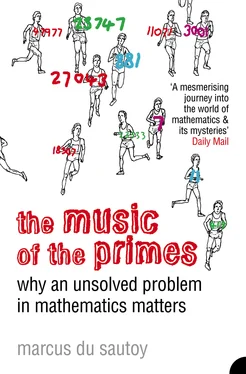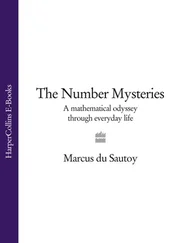The Music of the
Primes Why an Unsolved Problem in Mathematics Matters
Marcus du Sautoy

 Copyright
Copyright
Fourth Estate
An imprint of HarperCollins Publishers Ltd. 1 London Bridge Street London SE1 9GF
www.harpercollins.co.uk
This edition published by Harper Perennial 2004
First published by Fourth Estate 2003
Copyright © Marcus du Sautoy 2003
PS section copyright © Josh Lacey 2004
PS™ is a trademark of HarperCollins Publishers Ltd.
Marcus du Sautoy asserts the moral right to be identified as the author of this work
A catalogue record for this book is available from the British Library
All rights reserved under International and Pan-American Copyright Conventions. By payment of the required fees, you have been granted the nonexclusive, nontransferable right to access and read the text of this ebook on-screen. No part of this text may be reproduced, transmitted, downloaded, decompiled, reverse engineered, or stored in or introduced into any information storage and retrieval system, in any form or by any means, whether electronic or mechanical, now known or hereinafter invented, without the express written permission of HarperCollins e-books
HarperCollins Publishers has made every reasonable effort to ensure that any picture content and written content in this ebook has been included or removed in accordance with the contractual and technological constraints in operation at the time of publication
Source ISBN: 9781841155807
Ebook Edition © MAY 2012 ISBN: 9780007375875
Version: 2017-05-03
From the reviews of The Music of the Primes :
‘A gripping, entertaining and thought-provoking book. Du Sautoy is certainly a brilliant storyteller and introduces us to some great personalities … Even if you don’t understand the maths, this is still a fascinating book. And if you do understand some of it, it will have you running for your calculator as you try to work out some of the riddles along the way’
Independent on Sunday
‘Delightfully entertaining … [Du Sautoy] has been successful in setting up a compelling dramatis personae of mathematicians, with every character vividly illuminated with anecdotes and felicitous comment’
Guardian
‘Du Sautoy … laces the ideas with history, anecdote and personalia – an entertaining mix that renders an austere subject palatable … Even those with a mathematical allergy can enjoy du Sautoy’s depictions of his cast of characters’
The Times
‘The subject is daunting, but du Sautoy writes with admirable clarity and verve’
Daily Mail
‘An engaging and accessible history of work on prime numbers and the Riemann hypothesis’
Economist
‘Entertaining … looks certain to be a great success’
Nature
For the memory of
Yonathan du Sautoy October 21, 2000
Cover
Title Page
Copyright
Praise
Dedication
1 Who Wants To Be a Millionaire?
2 The Atoms of Arithmetic
3 Riemann’s Imaginary Mathematical Looking-Glass
4 The Riemann Hypothesis: From Random Primes to Orderly Zeros
5 The Mathematical Relay Race: Realising Riemann’s Revolution
6 Ramanujan, the Mathematical Mystic
7 Mathematical Exodus: From Göttingen to Princeton
8 Machines of the Mind
9 The Computer Age: From the Mind to the Desktop
10 Cracking Numbers and Codes
11 From Orderly Zeros to Quantum Chaos
12 The Missing Piece of the Jigsaw
Keep Reading
Acknowledgements
Further Reading
Illustration and Text Credits
Index
P.S.
About the Author
Portrait of Marcus du Sautoy
Snapshot
Top Ten Favourite Books
About the Book
A Critical Eye
Jerzy Grotowski
Read On
If You Loved This, You’ll Like …
Find Out More
About the Author
About the Publisher
CHAPTER ONE
Who Wants To Be a Millionaire?
‘Do we know what the sequence of numbers is? Okay, here, we can do it in our heads … fifty-nine, sixty-one, sixty-seven … seventy-one … Aren’t these all prime numbers?’ A little buzz of excitement circulated through the control room. Ellie’s own face momentarily revealed a flutter of something deeply felt, but this was quickly replaced by a sobriety, a fear of being carried away, an apprehension about appearing foolish, Unscientific . Carl Sagan, Contact
One hot and humid morning in August 1900, David Hilbert of the University of Göttingen addressed the International Congress of Mathematicians in a packed lecture hall at the Sorbonne, Paris. Already recognised as one of the greatest mathematicians of the age, Hilbert had prepared a daring lecture. He was going to talk about what was unknown rather than what had already been proved. This went against all the accepted conventions, and the audience could hear the nervousness in Hilbert’s voice as he began to lay out his vision for the future of mathematics. ‘Who of us would not be glad to lift the veil behind which the future lies hidden; to cast a glance at the next advances of our science and at the secrets of its development during future centuries?’ To herald the new century, Hilbert challenged the audience with a list of twenty-three problems that he believed should set the course for the mathematical explorers of the twentieth century.
The ensuing decades saw many of the problems answered, and those who discovered the solutions make up an illustrious band of mathematicians known as ‘the honours class’. It includes the likes of Kurt Gödel and Henri Poincaré, along with many other pioneers whose ideas have transformed the mathematical landscape. But there was one problem, the eighth on Hilbert’s list, which looked as if it would survive the century without a champion: the Riemann Hypothesis.
Of all the challenges that Hilbert had set, the eighth had a special place in his heart. There is a German myth about Frederick Barbarossa, a much-loved German emperor who died during the Third Crusade. A legend grew that he was still alive, asleep in a cavern in the Kyffhäuser Mountains. He would awake only when Germany needed him. Somebody allegedly asked Hilbert, ‘If you were to be revived like Barbarossa, after five hundred years, what would you do?’ His reply: ‘I would ask, “Has someone proved the Riemann Hypothesis?”’
As the twentieth century drew to a close, most mathematicians had resigned themselves to the fact that this jewel amongst all of Hilbert’s problems was not only likely to outlive the century, but might still be unanswered when Hilbert awoke from his five-hundred-year slumber. He had stunned the first International Congress of the twentieth century with his revolutionary lecture full of the unknown. However, there turned out to be a surprise in store for those mathematicians who were planning to attend the last Congress of the century.
On April 7, 1997, computer screens across the mathematical world flashed up some extraordinary news. Posted on the website of the International Congress of Mathematicians that was to be held the following year in Berlin was an announcement that the Holy Grail of mathematics had finally been claimed. The Riemann Hypothesis had been proved. It was news that would have a profound effect. The Riemann Hypothesis is a problem which is central to the whole of mathematics. As they read their email, mathematicians were thrilling to the prospect of understanding one of the greatest mathematical mysteries.
Читать дальше


 Copyright
Copyright










